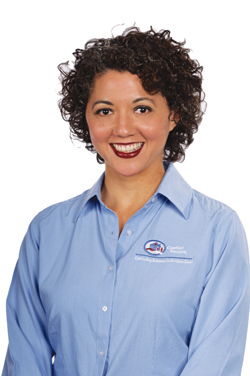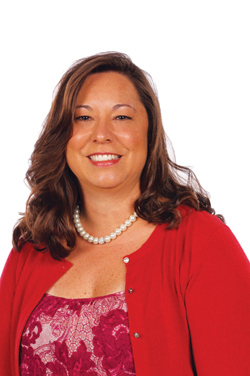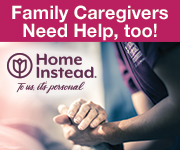HEALTH - SENIORS
Senior Living
September, 2011 - Issue #83
 Elizabeth Gleaton of Comfort Keepers In-home Care |
Elizabeth Gleaton of Comfort Keepers In-home Care
287-4200 www.comfortkeepers.com
What makes you proud to be a caregiver? I'm proud to work for Comfort Keepers because I appreciate the opportunity to do acts of kindness for those who have done so much for others over the course of their lives. I enjoy being of service in a way that would make my mom proud. The support and appreciation I receive from my clients, co-workers and Comfort Keepers staff members means so much to me.
What do you say to those who are curious about in-home care? Nothing is better than knowing that you or a loved one are being cared for in the comfort of their own home. Allowing a caregiver to be a part of your life makes things nice, too.
"If you LOVE someone, listen to them; give them the time
and attention they need. They will thrive!"
and attention they need. They will thrive!"
 Carmen Cabrera of Visiting Angels Living Assistance Services |
What makes you proud to work for your organization? One of the things that I appreciate about Visiting Angels is that they take many factors into consideration when matching a caregiver with a client. Personality, activity level and personal interests are only a few of the many variables considered when bringing a client and caregiver together.
What do you say to those who are curious about in-home care? In-home care provides family members peace of mind that their loved ones are being well taken care of. Being in the comfort of your own home, with its familiar surroundings, gives a client the freedom to engage in their regular activities. Most clients have a passion for a certain activity and I encourage them to continue developing it.
What does a Professional Caregiver Do?
According to Santa Clarita Valley & Antelope Valley Homemakers and Personal Attendants, a local company that provides experienced home care aides, professional caregivers are available to provide:
• bathing and personal care
• activities of daily living
• meal planning and preparation
• prescribed exercise and ROM
• linen change, laundry, ironing
• home management and chores
• grocery shopping and errands
• companionship and activities
• care of pets and care of plants
• transportation to physician
• assistance for special events
• community re-entry assistance
Santa Clarita Valley & Antelope Valley Homemakers and Personal Attendants; 298-5010 www.homemakersandattendants.com
Summerhill Villa Salutes Long-Serving Associates
In April of 2001, Summerhill Villa Independent and Assisted Senior Living Community opened its doors. Over the course of 10 years, the building has been remodeled with new decor and many families have visited. But there is one thing that hasn't changed: the long-term service of Summerhill associates.
Margo Popeil has been the bus-driver at Summerhill since its beginning. Margo says, "The residents are like family to me. I care about them just as I would my own parents." Jule Illis and Josie Higgs are "original" dining services associates. Jules, a long-time cook, is known as the "breakfast-guy" at Summerhill and will make just about anything the residents want. Josie Higgs, of Summerhill's wait staff, says, "I love taking care of our residents and putting a smile on their face. My husband enjoys hearing stories of my experiences with all the Summerhill residents." Executive Director Margie Veis, who has been part of the Summerhill team since its doors opened, says, "I feel blessed to be a part of the Summerhill family. I have watched it grow from an empty building to a community full of love and family and that just warms my heart." Also in the dedicated group of long-service employees are Meria Herrera, med-tech; Eugenia Rosales, med-tech; Yaga Blasczyk, caregiver; Donna Siano, caregiver; and Gilberto Huanosta, cook; 254-9933
 |
Common Hearing Aid Concerns, Answered
I'm worried that I won't be able to afford a hearing aid.
At Audiology Associates we understand that people have budgets (we all do). We have special offers and discounts monthly, plus we have a unique program called Care Credit, which allows for 0-percent financing on approved credit for 12 months. There are more affordable options than you might think. Come in, talk to us, and let's see what we can work out.
I'm worried that big, bulky hearing aids will make me look old.
The new devices are tiny, discreet, don't require bulky parts and can even allow you to be 'linked" to your cell phone, television, landline by a touch of a button. (We think that makes you look cool, not old!)
I'm worried that I won't find "the best" hearing aid.
There is no "best" hearing aid. There is only the "right one" for you. Selection of the "right" hearing aid will depend on your degree of hearing loss, your listening needs and expectations. Your audiologist will fully test and evaluate your hearing loss before you can find the hearing aid that is most appropriate for you. During this step, tell your audiologist what problems you are experiencing and what results you hope the hearing aids will provide. In addition to reviewing your tests with you, the audiologist will educate you about what you can and cannot realistically expect from hearing aids. In choosing the "right one," consider first its potential usefulness rather than its cosmetic appeal. Some people want the smallest hearing aid available because they fear they'll be embarrassed to have hearing aids show. But a small aid may not have the power or features you need to get the best results. Therefore, your audiologist will allow you to wear hearing aids for a trial period to ensure you find the one right for you. Your audiologist will provide follow-up care, education, training and hearing aid accessories so that you can achieve the best possible results from your hearing aids.
At Audiology Associates, Patrice Rifkind and Nina Ball have over 25 years of combined experience - and they really listen to your needs. You owe it yourself to not miss a sound! Your hearing is an important investment for a quality life and they are here to help; 284-1900 www.audiologyassociates.net
Check your Feet, don't Worry about Them
Diabetics are especially susceptible to foot injuries. When your feet become numb, they are at risk for becoming deformed. One way this happens is through ulcers. Open sores may become infected. Another way is the bone condition Charcot (pronounced "sharko") foot. This is one of the most serious foot problems you can face. It warps the shape of your foot when your bones fracture and disintegrate, and yet you continue to walk on it because it doesn't hurt. Diabetic foot ulcers and early phases of Charcot fractures can be treated with a total contact cast. The shape of your foot molds the cast. It lets your ulcer heal by distributing weight and relieving pressure. If you have Charcot foot, the cast controls your foot's movement and supports its contours - if you don't put any weight on it. To use a total contact cast, you need good blood flow in your foot. The cast is changed every week or two until your foot heals. A custom-walking boot is another way to treat your Charcot foot. It supports the foot until all the swelling goes down, which can take as long as a year. You should avoid putting your weight on the Charcot foot. Surgery is considered if your deformity is too severe for a brace or shoe.
Issues like these are why we advise our patients to check their feet daily, perhaps with the assistance of a friend or - in many cases - a mirror. Look for scratches, sores, blisters, toe problems, etc. and seek medical advice when necessary. The Footcare Center of Santa Clarita; 253-3668
Hair Help
Did you Know? Hair Loss Treatment Clinic offers a 10-percent discount off laser treatments and Revive hair products to all clients ages 65 and older; 294-6880 www.hltcnow.com
Free for Seniors!
Oak Tree Gun Club is now offering a free shotgun or handgun rental to seniors with the coupon on page 39; 259-7441
 |
As our loved ones - or we! - get older, we can't help but wonder: Is the home properly equipped with safety items? Can seniors get around, and in and out of the home, safely? If something bad were to happen, could emergency services and family be easily contacted?
The staff at Valencia Pharmacy Medical Equipment is able to help with all of these concerns and can help determine the best bathroom and home safety items - like grab bars, bath mats and toilet rails.
Another big safety concern is the area of mobility (motions like walking, sitting and getting up). Items like canes, walkers, scooters and lift chairs have come a long way! They now come in all shapes, styles and sizes, some of which may be covered by insurance. Even the lift chairs come in fabrics that will fit right in with home decor; these may be covered by insurance, too. Or - if there's just a temporary issue - Valencia Pharmacy Medical Equipment rents these items, as well as hospital beds and scooters.
If an accident were to occur, how would help be called? Valencia Pharmacy Medical Equipment also has a wide variety of medical alert items. These products can help a senior contact a loved one or call for emergency assistance with the touch of a button. There are also concerns about what would happen should someone fall and be rendered unconscious. Luckily, the company also carries alerts that can detect if someone has fallen and has not gotten up. The device will contact help without feedback from the injured party.
The experience and caring at Valencia Pharmacy Medical Equipment has recently been acknowledged by the health care community; they were just voted National Home Health Pharmacy of the Year by Good Neighbor Pharmacy (out of 2,700 locations). They welcome you to come and take advantage of the award winning safety services.
Valencia Pharmacy, Medical Equipment
& Wellness Center 255-7910
Saugus Drugs & Hallmark 296-3980
Valencia Town Center Pharmacy 291-1800
Take Good Care
Knowing your Meds Can Save Your Life
When you are sick or injured, the last thing on your mind may be if a new prescription might interfere with one of your current medications.
Most people don't keep track of their medications as well as they should; so, if they become ill or need a medical/surgical procedure performed, they're not in a good position to advise their physicians on what drugs they are taking. This can result in severe, negative consequences.
Anyone who is taking prescription drugs should keep a checklist of all their medications with them at all times in their wallet or purse, including over-the-counter drugs, such as acetaminophen (Tylenol), herbal drugs and all vitamin and mineral supplements.
Patients should share this information with their physician and pharmacist at all visits. This is particularly important if there is more than one physician involved so that duplications and interactions can be minimized. The list should be updated whenever a change occurs and shared with family members.
Today more than ever, patients need to be active partners with their health care team and exercise some control by asking questions and being diligent about tracking their prescriptions. Being a participant in their own health care can help maximize all the benefits today's medications have to offer.
Know your Medicines
Make sure your doctor knows which medicines you take. Keep a current list of all of your prescription and over-the-counter drugs. Show this list to your doctor and pharmacist at each visit. Your doctor or pharmacist can tell you, for example, if a medicine to treat blood pressure can cause dizziness and how to avoid problems.
• Find out if a new medicine replaces one you already take. Ask your doctor or pharmacist if the new drug will cause side effects with drugs you already take.
• Ask how to take new medicine correctly. Make sure you find out how often to take it and whether you should take the drug with food. Tell your doctor if you have side effects.
• Update your list of medications whenever a change occurs.
• Remember that alcohol interacts with many medicines. It can make side effects, like dizziness, worse.
• Never take medication in the dark. Make sure you can clearly read the name of the medication you are about to take.
• Take only the medication prescribed for you by your physician. Never share medications or take other people's medication.
• Check the expiration date on all medication. Throw away expired medications.
To receive a convenient prescription tracking form, call Henry Mayo Newhall Memorial Hospital; 253-8060
www.henrymayo.com
 |
Do you know what's in their Medicine Cabinet?
Home Instead Senior Care network, in a survey of 600 adults between the ages of 45 and 65, discovered that:
• 36 percent don't know where their parents' financial information is located
• 34 percent don't know whether their parents have a safe deposit box (or where the key is)
and most frighteningly...
• 31 percent don't know how many medications their parents take
Says Charlene Perrone, a CSA-certified senior advisor and owner of Home Instead Senior Care for Santa Clarita and Antelope Valleys, "We sometimes walk into homes and see medication everywhere, some of it from 1978!" She advises: "Get rid of expired medications or medications that shouldn't be taken anymore. That may be easier said than done when you have to compile information from three different doctors and you're not sure what's current. We've gone to doctor's appointments with a bag full of medicines, trying to determine what's current and what's not. Then fine tune the process and make sure that there's just one pharmacy handling the filling and refilling of prescriptions. Carry a list of current medications - and their dosages - in your wallet or purse. Mom and Dad should have a list of their medications with them, too."
Home Instead Senior Care; 254-8701
Making a Medicine Log
Medicine logs are available from many senior care services and even doctors offices, but it may be best to create your own customizable list. A huge list of samples are available online (search for "medicine log samples"). Here are some elements you may want to include:
• time of dosage, if medicine must be taken in the morning or before bed
• food/water requirements, if medicine must be taken with a meal or full glass of water
• day-by-day dosing, if medicines or supplements should not be taken each day
• acceptable over-the-counter and "do not take" medicine list, if certain pain relievers or supplements may negatively react with required prescriptions
• "do not eat" foods, if medicine is rendered ineffective or dangerous when certain foods are consumed (as is sometimes the case with grapefruit, for example)
|
||||||||||||||||||||||||||||




